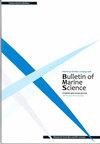Spatiotemporal variability in postsettlement energy reserves of the Caribbean spiny lobster
IF 1.2
4区 地球科学
Q3 MARINE & FRESHWATER BIOLOGY
引用次数: 0
Abstract
Spiny lobsters have a lengthy larval phase that develops in oceanic waters, followed by a nonfeeding, transparent postlarva (puerulus) that actively swims towards the coast to settle in shallow habitats. After settling, the transparent puerulus (TP) forms a new pigmented exoskeleton (pigmented puerulus, PP) and molts after 3–4 wks into the first juvenile instar (J1), which resumes feeding. Because the swim to the coast and the postsettlement molt are energetically demanding, the nutritional condition of pueruli and J1 is likely to vary with settlement location and over time, potentially playing a crucial role in the recruitment to the benthic population. We examined variation in total lipid and total protein content, as well as in lipid classes, size, and a condition index, in TP, PP, and J1 of Panulirus argus. Samples were obtained from pueruli collectors at two locations of the Mexican Caribbean coast about 150 km from each other in the four seasons of three consecutive years. Our results show a decrease in the total lipid (mainly phospholipid) and total protein content during the TP-PP-JI transition, and a high degree of temporal variability in the size and nutritional condition of pueruli settling at both locations. Despite this variability, all settlers exhibited a relatively consistent high nutritional status in comparison with other spiny lobster species. This may be related to a short onshore transport period of pueruli to this coast, suggesting that limitation of lipid reserves is unlikely to affect their subsequent survival and recruitment to the benthic population.加勒比龙虾定居后能量储备的时空变化
有刺的龙虾有一个漫长的幼虫阶段,在海水中发育,然后是一个不进食的透明幼虫(puerulus),它积极地向海岸游去,在浅水的栖息地定居。透明葛根(TP)沉淀后形成新的色素外骨骼(色素葛根,PP),并在3-4周后蜕皮,进入第一幼星(J1),恢复摄食。由于游向海岸和定居后蜕皮需要大量能量,因此葛uli和J1的营养状况可能会随着定居地点和时间的推移而变化,这可能在底栖生物种群的招募中起着至关重要的作用。我们检测了黑鲈TP、PP和J1中总脂质和总蛋白含量的变化,以及脂质类别、大小和条件指数的变化。在连续三年的四个季节中,从墨西哥加勒比海岸两个相距约150公里的地点的葛uli收集器中获得样本。我们的研究结果表明,在TP-PP-JI过渡期间,总脂质(主要是磷脂)和总蛋白含量下降,并且在两个地点的葛朴沉降的大小和营养状况具有高度的时间变化。尽管存在这种差异,但与其他多刺龙虾物种相比,所有定居龙虾都表现出相对一致的高营养状况。这可能与葛尔石到这一海岸的陆上运输时间较短有关,这表明脂质储备的限制不太可能影响它们随后的生存和加入底栖生物种群。
本文章由计算机程序翻译,如有差异,请以英文原文为准。
求助全文
约1分钟内获得全文
求助全文
来源期刊

Bulletin of Marine Science
地学-海洋学
CiteScore
2.90
自引率
6.70%
发文量
25
审稿时长
6-12 weeks
期刊介绍:
The Bulletin of Marine Science is a hybrid open access journal dedicated to the dissemination of research dealing with the waters of the world’s oceans. All aspects of marine science are treated by the Bulletin of Marine Science, including papers in marine biology, biological oceanography, fisheries, marine policy, applied marine physics, marine geology and geophysics, marine and atmospheric chemistry, meteorology, and physical oceanography. In most regular issues the Bulletin features separate sections on new taxa, coral reefs, and novel research gear, instrument, device, or system with potential to advance marine research (“Research Tools in Marine Science”). Additionally, the Bulletin publishes informative stand-alone artwork with accompany text in its section "Portraits of Marine Science."
 求助内容:
求助内容: 应助结果提醒方式:
应助结果提醒方式:


